Abbe R. Gluck
Faculty Director and Alfred M. Rankin Professor of Law
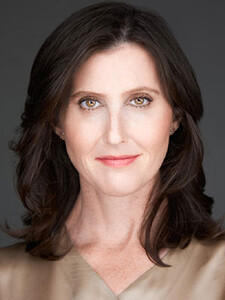
Abbe R. Gluck ’00 is the Alfred M. Rankin Professor of Law and the Founding Faculty Director of the Solomon Center for Health Law and Policy at Yale Law School. She is also Professor of Internal Medicine (General Medicine) at Yale School of Medicine and a Professor in the Institution for Social and Policy Studies at Yale. From November 2020 to November 2023, she served as Special Counsel in the Office of White House Counsel, working with the administration’s COVID-19 Response team in the White House as well as on other issues, including the Affordable Care Act. Professor Gluck joined Yale Law School in 2012, having previously served on the faculty of Columbia Law School. She is an expert on Congress and the political process, federalism, civil procedure, and health law, and is chair of Section on Legislation and the Law of the Political Process for the Association of American Law Schools.
Gluck has extensive experience working as a lawyer in all levels of government. Prior to joining Columbia, she served in the administration of New Jersey Governor Jon Corzine as the special counsel and senior advisor to the New Jersey Attorney General; and in the administration of New York City Mayor Michael Bloomberg, as chief of staff and counsel to the Deputy Mayor for Health and Human Services, senior counsel in the New York City Office of Legal Counsel, and deputy special counsel to the New York City Charter Revision Commission. Prior to law school, she worked in the U.S. Senate for Senator Paul S. Sarbanes of Maryland. Before returning to government work after law school, Professor Gluck was associated with the Paul Weiss firm in New York. She earned her B.A. from Yale University, summa cum laude, and her J.D. from Yale Law School. Following law school, she clerked for then-Chief Judge Ralph K. Winter on the U.S. Court of Appeals for the Second Circuit, and for U.S. Supreme Court Justice Ruth Bader Ginsburg. Gluck’s scholarship has been published in the Yale Law Journal, the Harvard Law Review, the Stanford Law Review, the Columbia Law Review, and many other journals. Among her most recent work is the most extensive empirical study ever conducted about the realities of the congressional law-making process (published in the Stanford Law Review) and the Harvard Law Review’s Supreme Court issue comment on King v. Burwell, the 2015 challenge to the Affordable Care Act. She also served as co-counsel on a Supreme Court brief in both King and the 2012 ACA challenge, NFIB v. Sebelius. In 2015, Gluck was both appointed by Gov. Malloy to serve on the Uniform Law Commission and elected to the American Law Institute.
Jeremy Pilaar
Executive Director

Jeremy Pilaar ’18 is the Executive Director of the Solomon Center for Health Law and Policy at Yale Law School. Before joining Yale, Pilaar served as Lead Deputy County Counsel for the County of Santa Clara Health System, the second-largest public health care system in California. In that role, he oversaw the team of attorneys that provides legal advice to the system’s executive leaders on all aspects of hospital and clinic operations, including finance and reimbursement, regulatory compliance, care quality and safety, and patient privacy. Pilaar previously worked as a staff attorney at the Legal Aid Society of San Mateo County’s Health Consumer Center, as a health care antitrust associate at plaintiff-side law firm Lieff Cabraser Heimann & Berstein, as the SFALP Fellow at Yale Law School and the San Francisco City Attorney’s Office, and as a health systems researcher at the University of Oxford’s European Studies Centre. He holds a B.A. in political economy from the University of California, Berkeley, an M.Phil. in comparative social policy from the University of Oxford, and a J.D. from Yale Law School.
Elle Rothermich
Deputy Director and Senior Research Fellow

Elle Rothermich is a Senior Research Fellow at the Solomon Center. Her scholarship sits at the intersection of civil procedure, bioethics, and health justice. Currently, her research focuses are mass tort multidistrict litigation, brain-computer interfaces, and the health impacts of incarceration. Elle’s recent work can be found in the University of Pennsylvania Journal of Law & Public Affairs and The Regulatory Review. Before coming to Yale, Elle clerked for the Honorable Anthony J. Scirica of the U.S. Court of Appeals for the Third Circuit. She received her J.D. and Master of Bioethics from the University of Pennsylvania, where she was a Silverman-Rodin Scholar and Littleton Fellow. Elle was a College Scholar at Cornell University, graduating with a B.A. in Government and English, summa cum laude, in 2019.
James Bhandary-Alexander
MLP Legal Director, Clinical Lecturer in Law, and Research Scholar
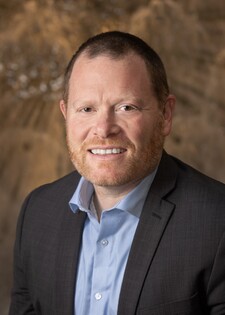
James Bhandary-Alexander is the Legal Director of the Medical Legal Partnership at the Solomon Center for Health Law and Policy, and a Clinical Lecturer in Law and Research Scholar at Yale Law School. Previously, he worked as an attorney at New Haven Legal Assistance, where he represented clients in labor and employment, housing, public benefits, police misconduct, and civil rights cases, and as the Thomas Emerson Fellow at the law firm of David Rosen & Associates. Bhandary-Alexander also served as co-chair of Connecticut’s Low-Wage Employer Advisory Board and on the state’s Task Force on Domestic Workers. In 2016, he received the Micah Award from the Naugatuck Valley Project and the Brazilian Worker Center; and in 2019, he received the Unsung Hero Award from the Morris and Irmgard Wessel Fund. He has been interviewed about his cases by the New York Times, Bloomberg News, Sports Illustrated, In These Times, the Hartford Courant, and many other publications. Bhandary-Alexander was a Public Interest Law Scholar at the Northeastern University School of Law, where received his JD, and graduated with degrees in History and Afro-American Studies from the University of Wisconsin-Madison.
Rachel Lerman
MLP Fellow

Rachel Lerman is the Medical Legal Partnership Fellow at the Solomon Center for Health Law and Policy. She previously worked as a staff attorney at the Florence Immigrant & Refugee Rights Project in Arizona, where she represented adults in U.S. immigration detention in removal proceedings. Lerman received her J.D. from Wayne State University Law School and graduated with a B.S. in Community and Environmental Sociology from the University of Wisconsin- Madison.
Greg Curfman
Distinguished Physician Scholar in Residence
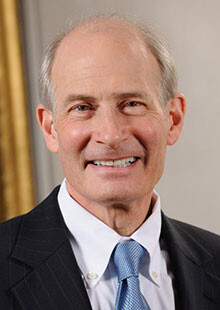
Dr. Greg Curfman is the Senior Advisor and Physician Scholar in Residence for the Solomon Center for Health Law and Policy at Yale Law School. He is also the Deputy Editor of JAMA and former Health Care Policy and Law Editor for JAMA Internal Medicine. Dr. Curfman previously served as the Editor-in-Chief of Harvard Health Publications at Harvard Medical School, a member of the faculty of Harvard Medical Schooland a member of the affiliated faculty at Harvard Law School. Curfman also previously served as the Executive Editor of the New England Journal of Medicine, where he founded Perspective, the journal’s lead section that focuses on the intersection between medicine and society, including health policy, health law, and health-care reform.
In addition to writing scores of editorials and Perspective articles for The New England Journal of Medicine, Curfman has given testimony to the U.S. Senate and House of Representatives, as well as contributing amicus briefs in Supreme Court health law cases.
Curfman is board certified in internal medicine and cardiology. He graduated magna cum laude from Princeton University, cum laude from Harvard Medical School, and trained in internal medicine and cardiology at Massachusetts General Hospital and Brigham Women’s Hospital. He directed the Coronary Care Unit at Brigham and Women’s Hospital and Dartmouth-Hitchcock Medical Center, and was the medical director of the Cardiovascular Health Center, a heart disease prevention program at Massachusetts General Hospital.
Nina A. Kohn
Distinguished Scholar in Elder Law
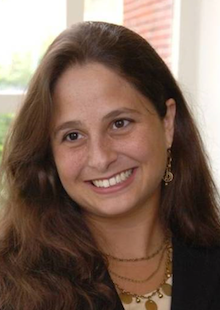
Nina A. Kohn is the Solomon Center Distinguished Scholar in Elder Law. She is also the David M. Levy Professor of Law at Syracuse University College of Law, a faculty affiliate with the Syracuse University Aging Studies Institute, a member of the American Law Institute, and a former Visiting Professor at Yale Law School. Kohn is a leading authority in elder law and the civil rights of older adults. Her research focuses on how the law shapes and responds to the experience of growing older and the needs of older adults. She regularly writes for both academic and non-academic audiences, and her work has appeared in diverse fora including the Harvard Civil Rights-Civil Liberties Law Review, the Washington University Law Review, and the Washington Post. She is also the author of Elder Law: Practice, Policy & Problems (Wolters Kluwer, 2d ed. 2020). Kohn served in Reporter for the Third Revision of the Uniform Guardianship and Protective Proceedings Act and has testified about guardianship abuse before the U.S. Senate Special Committee on Aging. Her current public interest roles include, among others, Reporter for the Uniform Law Commission’s Study Group on the Uniform Health Care Decisions Act; Advisor to the American Law Institute’s Restatement of the Law Third, Torts: Concluding Provisions project; and Director of the Aging, Law, and Society Collaborative Research Network. Kohn earned her earned an A.B. summa cum laude from Princeton University and a J.D. magna cum laude from Harvard University. She clerked for the Honorable Fred I. Parker on the United States Court of Appeals for the Second Circuit.
Eugene Rusyn
Associate Research Scholar and Senior Academic Fellow
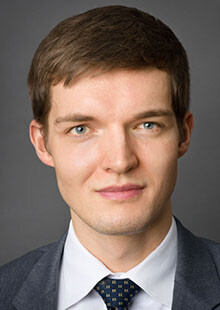
Eugene Rusyn YLS ’17 is an Associate Research Scholar in Law and a Senior Academic Fellow with the Solomon Center for Health Law and Policy. His research interests include health law, environmental law, legal history, and the study of government bureaucracy. Rusyn’s work currently focuses on end-of-life law and the relationship between legal systems and cancer treatment. His research builds on time he spent with organizations addressing these issues in recent years, including an initiative developed at the Disability Rights Legal Center focused on the relatively recent emergence of “aid in dying” laws. Rusyn is also in the process of conducting a study on environmental regulations drawing on extensive field work and expanding on his interests in environmental law, administrative law, and the study of bureaucratic behavior. Rusyn was a 2015 recipient of the Paul and Daisy Soros Fellowship for New Americans. He holds a B.A. from New York University and a J.D. from Yale Law School. He is the founding editor-in-chief of the Yale Palliative Care GPS.
Zachary E. Shapiro
Senior Research Fellow and Senior Advisor, Consortium for the Advanced Study of Brain Injury Project
Zachary E. Shapiro is a Research Fellow with the Solomon Center's Brain Injury Project, a collaboration with CASBI (Consortium for the Advanced Study of Brain Injury) at Weill Cornell Medical College. He also holds an appointment as a Post-Doctoral Fellow in the Division of Medical Ethics at Weill Cornell Hospital and is the Co-Chair of the Hospital Ethics Committee at The Rockefeller University in New York City. Shapiro graduated from Harvard Law School cum laude in 2016, pursuing his interests in law, ethics, and biomedicine. His scholarship in law school concerned the use of functional neuroimaging in lie detection, the ethical issues raised by large-scale genomic research, and the growing concern over head injuries in youth football. He has authored neuroscience publications exploring neuroimaging, neuroethics, and legal implications of neuroscience, and he has written on the ethics of genomic research and big data. While at Harvard Law, Shapiro served as a Legal Fellow at Harvard’s Multi-Regional Clinical Trials Center, working on projects related to returning clinical trial results, post-trial access, and the ethics of clinical trials. He was awarded a Fellowship at the Petrie-Flom Center for Health Law Policy, Biotechnology, and Bioethics at Harvard Law School, a Fellowship at Auschwitz for the Study of Professional Ethics, and spent a summer working on legal projects in the Department of Bioethics at the National Institutes of Health. After law school, Shapiro served as the Presidential Scholar of Law at the Hastings Center Bioethics Research Institute, one of the premier bioethical institutes in the U.S, and a Fellow at the Massachusetts General Hospital’s Center for Law, Brain, and Behavior. In 2017, he clerked for the Honorable Judge Timothy B. Dyk on the Court of Appeals for the Federal Circuit in Washington, D.C. A native New Yorker, he received his B.A. in Human Health and Medical Ethics from Brown University in 2009 and an M.Sc. in Biomedicine, Bioscience, and Society in 2012 from the London School of Economics and Political Science.
Blake Shultz
Associate Research Scholar
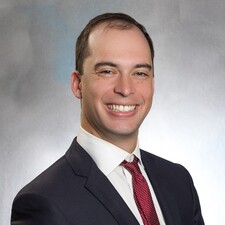
Blake Shultz YLS ’21, MD ’22 is an Associate Research Scholar with the Solomon Center for Health Law and Policy. He is also a resident physician in the Harvard Affiliated Emergency Medicine Residency program with Harvard Medical School and Mass General Brigham. His research with the Solomon Center focuses on medical-legal partnerships, health equity, policy, and public health. He holds a B.A. from Cornell University, a J.D. from Yale School of Law, and an M.D. from Yale School of Medicine.
Joseph Fins
Visiting Professor of Law and Solomon Center Distinguished Scholar in Medicine, Bioethics, and the Law
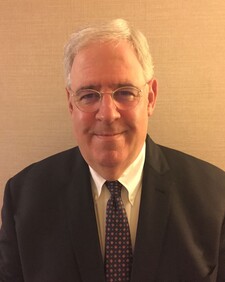
Dr. Joseph J. Fins is the Solomon Center Distinguished Scholar in Medicine, Bioethics, and the Law at Yale Law School. He is also the co-director of CASBI (Consortium for the Advanced Study of Brain Injury) at Weill Cornell Medical College, which seeks to understand mechanisms of recovery following severe brain injuries and to develop novel therapeutic interventions and strategies. While at Yale, Dr. Fins continues his work with YLS students on legal issues related to patients with severe brain injuries. Dr. Fins works with students on projects related to the law and severe brain injuries, in the hopes of expanding their access to health care and medical research while asserting that the marginalization of these individuals raises important questions for disability and civil rights. This focus expands scholarship presented in his book Rights Come to Mind: Brain Injury, Ethics, and the Struggle for Consciousness.
Dr. Fins is the author of more than 300 publications, including co-authoring the landmark 2007 Nature paper describing the first use of deep brain stimulation in the minimally conscious state, and his books include A Palliative Ethic of Care: Clinical Wisdom at Life’s End (Jones and Bartlett, 2006).
Dr. Fins holds degrees from Cornell University Medical College and Wesleyan University, and he completed his residency in Internal Medicine and Fellowship in General Internal Medicine at the New York Hospital-Cornell Medical Center.
John V. Jacobi
Visiting Professor of Law and Solomon Center Distinguished Scholar in Disability Law

John Jacobi is a visiting professor of law at Yale Law School and the Dorothea Dix Professor of Health Law & Policy at Seton Hall Law School, where he served as the faculty director of the Health Law and Policy Program until 2021. Prior to teaching, Jacobi served as senior associate counsel to the Governor of New Jersey, counseling in matters including health, human services, child welfare, and insurance. He received the American Association of Law School’s Elyn R. Saks Lifetime Achievement Award in the section on law and mental disability in 2021. Jacobi earned a B.A. from State University College at Buffalo and a J.D. from Harvard Law School.
Aaron S. Kesselheim
Visiting Professor of Law and Solomon Center Distinguished Visitor
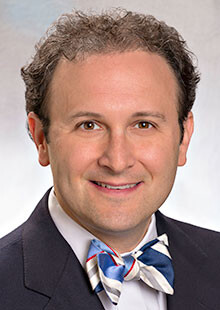
Aaron S. Kesselheim is a Visiting Professor of Law and Solomon Center Distinguished Visitor at Yale Law School, as well as a Professor of Medicine at Harvard Medical School, a faculty member in the Division of Pharmacoepidemiology and Pharmacoeconomics in the Department of Medicine at Brigham and Women’s Hospital, faculty supervisor for the Petrie-Flom Center for Health Law Policy, Biotechnology, and Bioethics at Harvard Law School, a faculty member of the Harvard Center for Bioethics, and a Research Associate in the Department of Health Policy and Management at the Harvard School of Public Health. His research focuses on the effects of intellectual property laws and regulatory policies on pharmaceutical development, the drug approval process, and the costs, availability, and use of prescription drugs both domestically and in resource-poor settings. He has also investigated how other issues at the intersection of law and public health can affect the health care system, including health care fraud, expert testimony in malpractice cases, and insurance reimbursement. He graduated from Harvard College and received his postgraduate training at the University of Pennsylvania School of Medicine and Law School, and most recently at the Harvard School of Public Health.
Mark Barnes
Visiting Lecturer in Law

Mark Barnes ’84 is a Visiting Lecturer in Law at Yale Law School. He is a partner at Ropes & Gray LLP and a lecturer at Harvard Law School, and serves as Harvard faculty co-chair for the Multi-Regional Clinical Trials Center at Harvard. Since 1999, he has been a lecturer at Yale School of Medicine. Barnes previously served as the senior associate provost for research and senior research officer for Harvard University, and in 2004 was the founding executive director of the Harvard AIDS treatment programs in Nigeria, Tanzania, and Botswana. He has served as the executive vice president and chief administrative officer of St. Jude Children's Research Hospital, and has held senior appointed positions in the New York City and New York State Departments of Health. He currently co-chairs the Subcommittee on Harmonization of Research Regulations for the U.S. Department of Health and Human Services, and is a member of the Ethics Working Group of the National Institute of Health’s HIV Prevention Trials Network. Barnes holds degrees from Columbia, Yale, and Bennington College.
Claudia Haupt
Senior Visiting Research Scholar
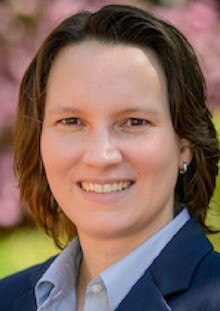
Claudia E. Haupt is an Associate Professor of Law and Political Science at Northeastern University. Professor Haupt’s current research is situated at the intersection of the First Amendment, health law and torts in the context of professional speech. Her further research interests include constitutional law and comparative constitutional law as well as law and technology. Prior to joining Northeastern, Professor Haupt was a resident fellow with the Information Society Project at Yale Law School, where she continues to be an affiliate fellow, and a research fellow with the Solomon Center for Health Law and Policy at Yale Law School. She has also held an appointment as associate-in-law at Columbia Law School and, prior to that, taught at George Washington University Law School. Before entering academia, Professor Haupt clerked at the Regional Court of Appeals of Cologne and practiced law at the Cologne office of the law firm of Graf von Westphalen, with a focus in information technology law. She is admitted to practice in Germany and New York. She holds a PhD in political science from the University of Cologne, a JSD from Columbia Law School, an LLM (with highest honors) from George Washington University and her first law degree from the University of Cologne.
